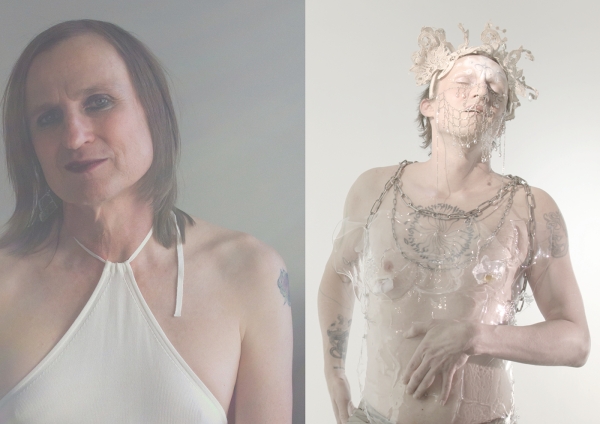What’s it like to be a woman when the world’s on fire?
What’s it like
to be transgender when people want you dead?
Was ‘Nature’ always Trans*?
Can its destruction then be understood
as transphobia – another mode of transfem erasure?
If technology was always nature, and labor was always feminine,
how might their interwoven worlding be shaped by artistic and academic modes of knowledge production?
What do trans*
bodies know that art and science must now learn?
Drawing on Luce DeLire’s analysis of McKenzie Wark’s ouvre and
Ms. Wark’s performance art collaboration with Ariadne Randall, Ms. Wark and Ms. Randall will discuss modes of knowing in performance,
media, and trans* life; the challenges and benefits of interdisciplinary formal production; and ask if Cybele ever really
left us. If World is a cybernetic, transgender goddess from the future – then, honey, who’s an alien now? The event follows
the premiere "Reverse Cowgirl II: Ride to the Top", at BRUT, April 10th, on the night before this discussion.
McKenzie
Wark
is an Australian-born writer and scholar. Wark is known for her writings on media theory, critical
theory, new media, and the Situationist International. Her best known works are A Hacker Manifesto and Gamer Theory. Her most
recent, post-transition works of autofiction and autotheory – including Raving, Reverse Cowgirl and Love and Money, Sex and
Death – brought her new audiences. She is a professor of media and cultural theory at the New School in New York.
Ariadne Randall
is an American artist, composer and writer based in Vienna. Her work practices
worldbuilding through transmedia narrative. Through strategies of material depth and formal juxtaposition, she creates spaces
for imagination in sound, language and image. She holds degrees in classical composition and contemporary art from UCLA and
Bard MFA. Her work has been heard widely, from Lincoln Center and a recent song cycle for the Volksoper Wien to countless
basements. Her Reverse Cowgirl Quartet rides her gender transition towards larger questions of identity and becoming. Her
debut record as a transgender woman was released to critical acclaim in 2024 on Oxtail Recordings. She is represented by Galerie
Peter Gaugy (Brussels/Vienna).
Nanna Heidenreich
is a media culture scholar and
curator for film, video and political and theoretical interventions. Since October 2020, she has held the professorship for
Transcultural Studies at the University of Applied Arts in Vienna, following positions in Düsseldorf, Cologne, Hildesheim
and Braunschweig.
The School for Transformation (Transformation Studies. Art x Science) is presenting
a lecture series that explores the role of aesthetics in transdisciplinary research. Artistic strategies, just like transdisciplinary
approaches, do not start from fixed onto-epistemic positions, but draw on a multiplicity of registers and perceptions to disrupt
hegemonic knowledge regimes.
Likewise, both reject disciplinary boundaries in favor of transversal approaches, aiming
to undo rigid distinctions between thinking and practice, embodied knowledge and scientific expertise. Based on a heterogenous
mix of theoretical and practice-based interventions the lecture series asks:
To what extent can artistic strategies
be transferred to other contexts? And is that indeed desirable, given the situated, open-ended, and speculative nature of
arts-based research? Where do we need to insist on the autonomy of aesthetic practice to stay clear from the demands of transferability,
valorisation and impact?
In this spirit the series assembles a plurality of voices, case studies and theoretical
perspectives, to explore what artistic strategies and aesthetics bring to the field of transdisciplinary research.




